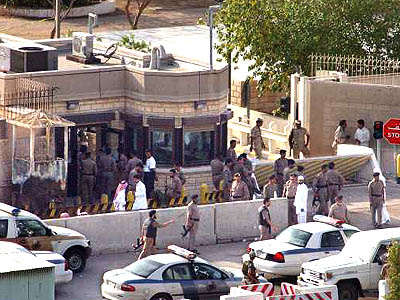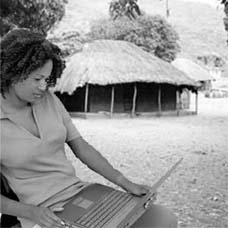December 7, 2004: Headlines: COS - Oman: Diplomacy: Saudi Arabia: Terrorism: Los Angeles Times: Oman RPCV Gina Abercrombie-Winstanley, the U.S. consul general in the Saudi Arabian port city of Jiddah, safe after attack on consulate
Peace Corps Online:
Directory:
Oman:
Special Report: Diplomat and Oman RPCV Oman RPCV Gina Abercrombie-Winstanley:
December 7, 2004: Headlines: COS - Oman: Diplomacy: Saudi Arabia: Terrorism: Los Angeles Times: Oman RPCV Gina Abercrombie-Winstanley, the U.S. consul general in the Saudi Arabian port city of Jiddah, safe after attack on consulate
Oman RPCV Gina Abercrombie-Winstanley, the U.S. consul general in the Saudi Arabian port city of Jiddah, safe after attack on consulate

Oman RPCV Gina Abercrombie-Winstanley, the U.S. consul general in the Saudi Arabian port city of Jiddah, safe after attack on consulate
Militants Kill Five at U.S. Consulate
December 7, 2004
Times Headlines
By Paul Richter and Rami G. Khouri, Special to The Times
Caption: Saudi forces gather outside the U.S. consulate compound in Jidda after Islamic militants forced their way in and killed five employees. Officials said four of the five assailants were killed, and the last was being held.
(Saudi Gazette)
JIDDA, Saudi Arabia — Militants blasted their way into the U.S. Consulate compound in the Saudi city of Jidda on Monday in a brazen midday attack that left five consulate employees and four attackers dead.
None of those killed were American. The attackers, believed to be Al Qaeda sympathizers, hurled grenades to break through the outer gate of the compound but were overwhelmed by Saudi security forces before they could penetrate the main building where Americans were working, Saudi and U.S. officials said.
It was the deadliest extremist attack in the kingdom since May, and the first in which militants struck a Western diplomatic facility in Saudi Arabia.
Analysts said the assault demonstrates that although militant cells have been affected by increasing pressure from the Saudi government — including a raid two weeks ago in Jidda — they remain capable of mounting deadly operations.
The slain consulate workers were a Saudi, a Yemeni, an Egyptian, a Pakistani and an Indian. One of the workers was a security guard, and the rest were motor pool and general service employees, officials said. One American was hurt, suffering slight injuries during a hurried evacuation.
President Bush said the attacks "remind us that the terrorists are still on the move" around the world.
"They want us to leave Saudi Arabia, they want us to leave Iraq, they want us to grow timid and weary in the face of their willingness to kill randomly, kill innocent people," he said.
The assault began about 10:30 a.m., when three attackers riding in an automobile hurled an incendiary grenade at the main gate of the consulate complex, a large facility that was once the U.S. Embassy, according to officials and reports from the scene. Incendiary grenades are used to start fires and generate thick smoke that can conceal movement, officials said.
The first grenade apparently was intended to distract security forces, because the attackers then drove to the eastern gate of the compound. When they were refused entry, the three men climbed out of their car, throwing grenades and spraying the area with fire from automatic weapons, witnesses and officials said.
Joined by two attackers from a second car, the militants walked through the gate into the grassy courtyard area inside the high outer wall, which is draped with barbed wire. A number of smaller buildings are clustered in the courtyard, in front of the main building.
Adel Jubeir, Saudi foreign affairs advisor, said the gunmen had called a local emergency telephone line, telling authorities: "This is the Fallouja Brigade. We are in the U.S. Embassy…. Tell the security forces not to enter the embassy. We have 17 hostages."
Saudi officials denied that anyone was held hostage. But the attackers' presence threatened about 30 people in the immediate area, Jubeir said. These included employees and Saudis who were in the compound seeking visa or other services.
At the time of the attack, there may have been as many as 100 people within the complex, which covers several acres, Jubeir said.
The attackers hauled down the U.S. flag and burned it, Associated Press reported.
A Saudi official who asked not to be identified said he suspected the "Fallouja Brigade" name had little significance and was chosen by the militants only because of recent news coverage about the U.S. offensive against insurgents in Fallouja, Iraq.
The Fallouja Brigade was also the name of an Iraqi force that was handed control of that insurgent stronghold last spring after an aborted U.S. siege. The force, which worked with the insurgents, was later disbanded.
In a statement, the Saudi government referred to the consulate attackers as "deviants," a term it has used before to refer to members of Al Qaeda and related groups.
Late Monday, a group called Al Qaeda Organization in the Arabian Peninsula took responsibility for the attack in a statement posted on a website often used by Islamists. The statement, whose authenticity could not be verified, said a "squadron" had stormed "one of the bastions of the crusaders in the Arabian Peninsula," wire services reported.
By 11 a.m., about 250 Saudi military vehicles and more than 1,000 Saudi security personnel had encircled the consulate, said Mohammed Sabeel, a witness who works close to the compound.
Snipers were positioned on buildings overlooking the grounds.
After the attack began, most consulate employees sought protection in two bomb-proof "safe havens" in the main building. One of these rooms is in the consul general's office, and the other is adjacent to the public relations department, a consulate employee said.
The consul general, Gina Abercrombie-Winstanley, was in her office at the time and heard the gunfire, State Department spokesman Adam Ereli said.
Jubeir said Saudi special forces arrived within 30 minutes of the first shots and took about four minutes to kill three of the attackers and capture the two others.
One of those captured later died, Saudi officials said in televised news reports.
Jubeir said security forces spent several hours securing the area and evacuating the wounded.
Other accounts from the scene differed on some specifics. One witness said bursts of gunfire continued until 2:15 p.m. Ambulances continued to leave the scene after 3:45 p.m., the witness said.
Senior Saudi and U.S. officials said one security guard had been killed in the attack. But earlier, Saudi security officials on the scene said two consulate guards had been killed in the first moments of the attack.
Consulate employees said the U.S. facility, like others around the country, has been thinly staffed recently. Families of American employees had been urged to leave for security reasons, and some foreign service employees preferred to leave the country rather than remain without their families, consulate employees said.
U.S. officials in Washington said the consulate was at its "full complement" of employees, but they would not give numbers. There were no dependents of consulate staff at the compound, Ereli said.
"The only injury we sustained is great shock," one consulate employee, who asked not to be identified, told a reporter after the attack. "You cannot believe what we were feeling, locked in and knowing that we were under attack. I just hope I will never see such a day again."
Another employee, reached by telephone at 12:10 p.m., told a reporter: "We are under attack. If I live, you are invited for dinner."
In the last major attack in Saudi Arabia, 22 people, mostly foreigners, were killed in an assault on two businesses and a residential compound in Khobar in May. A month later, an American engineer, Paul. M. Johnson Jr., was captured and beheaded by terrorists believed linked to Al Qaeda.
Saudi extremists have increasingly targeted Americans and other Westerners because earlier attacks that killed Saudis backfired, undercutting their support in the country. The militants' goal is to drive the United States and foreigners out of the kingdom and to undermine the ruling Saud family.
One Saudi official said the consulate assault was "pretty amateurish" because of the way the attackers attempted to pierce the high security around the consulate.
But Deputy Secretary of State Richard L. Armitage said the attackers seemed to have taken some care preparing for the assault.
"It's quite clear that those terrorists who attacked our consulate in Jidda had observed our procedures for some time," Armitage told reporters in Washington. "Clearly, we'll do an after-action report and we'll take any remedial activity that is necessary."
Edward Walker Jr., former assistant secretary of State for the Middle East, said the attack stood out because of the way that "it very blatantly targeted America."
Walker, who is president of the Middle East Institute, added that the incident would probably have the effect of "reinforcing the cooperation we have with the Saudis on this. If the idea was to disrupt the relationship, they've got the wrong idea."
When this story was posted in December 2004, this was on the front page of PCOL:
 | Is Gaddi Leaving?
Rumors are swirling that Peace Corps Director Vasquez may be leaving the administration. We think Director Vasquez has been doing a good job and if he decides to stay to the end of the administration, he could possibly have the same sort of impact as a Loret Ruppe Miller. If Vasquez has decided to leave, then Bob Taft, Peter McPherson, Chris Shays, or Jody Olsen would be good candidates to run the agency. Latest: For the record, Peace Corps has no comment on the rumors. |
 | The Birth of the Peace Corps
UMBC's Shriver Center and the Maryland Returned Volunteers hosted Scott Stossel, biographer of Sargent Shriver, who spoke on the Birth of the Peace Corps. This is the second annual Peace Corps History series - last year's speaker was Peace Corps Director Jack Vaughn. |
 | Charges possible in 1976 PCV slaying
Congressman Norm Dicks has asked the U.S. attorney in Seattle to consider pursuing charges against Dennis Priven, the man accused of killing Peace Corps Volunteer Deborah Gardner on the South Pacific island of Tonga 28 years ago. Background on this story here and here. |
Read the stories and leave your comments.

Some postings on Peace Corps Online are provided to the individual members of this group without permission of the copyright owner for the non-profit purposes of criticism, comment, education, scholarship, and research under the "Fair Use" provisions of U.S. Government copyright laws and they may not be distributed further without permission of the copyright owner. Peace Corps Online does not vouch for the accuracy of the content of the postings, which is the sole responsibility of the copyright holder.
Story Source: Los Angeles Times
This story has been posted in the following forums: : Headlines; COS - Oman; Diplomacy; Saudi Arabia; Terrorism
PCOL15223
45
.









